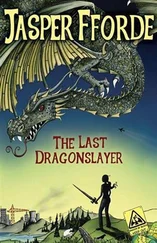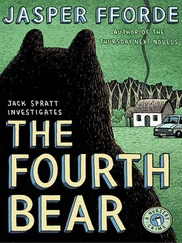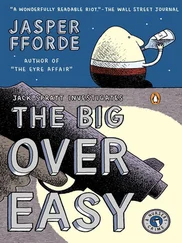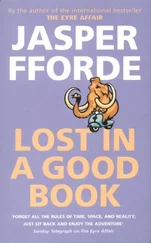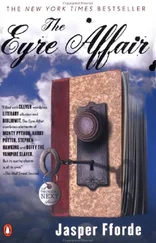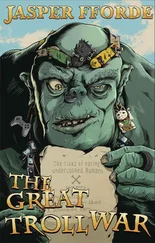I knew this too – it wasn’t really news. I think UKARP suspected that when push came to shove, the rabbit’s innate dislike of confrontation and the Taskforce’s innate propensity to confrontation would win the day.
The conversation stopped for a minute or two while the Venerable Bunty cut the hardly-squashed-at-all walnut cake, but soon picked up again as we learned that the Venerable Bunty was brought up in-colony and had been doing miracles since passing her GCSEs, so had been a shoo-in to take over as spiritual leader when the previous Bunty died, herself the fifth since the Event. Our meeting seemed chatty rather than focused, and at one point I asked Finkle whether he wanted me to do anything.
‘Not really,’ he said. ‘I just wanted to meet you. Get the measure of Connie’s neighbour, see what he has to offer. Now that I have, I’d like you to play along with Mr Ffoxe. You can tell him about this meeting if you like. There’s been no breach of the law, just a minor employment infraction on your behalf for talking to me.’
‘Are you sure?’ I asked, disappointed that I wasn’t going to be of more use.
‘We’re sure,’ said Finkle. ‘You can tell him about Bunty, too. Just give us four hours to make ourselves scarce before you do.’
‘That’s it?’ I said.
‘That’s it.’
So while we ate the excellent walnut cake that the Venerable Bunty’s mother’s sister’s daughter’s husband’s son had baked, Venerable Bunty and Connie told us about life inside the colonies, which despite the lack of freedom and limited space were the only areas within the United Kingdom that ran themselves entirely on rabbit socio-egalitarian principles.
‘It’s occasionally aggressive and often uncompromising,’ said Finkle, ‘but from what I’ve seen of both systems, a country run on rabbit principles would be a step forward – although to be honest, I’m not sure we’d be neurologically suited to the regime. While most humans are wired to be reasonably decent, a few are wired to be utter shits – and they do tend to tip the balance.’
‘The decent humans are generally supportive of doing the right thing,’ said the Venerable Bunty, ‘but never take it much farther than that. You’re trashing the ecosystem for no reason other than a deluded sense of anthropocentric manifest destiny, and until you stop talking around the issue and actually feel some genuine guilt, there’ll be no change.’
‘Shame, for want of a better word, is good,’ said Finkle. ‘Shame is right, shame works . Shame is the gateway emotion to increased self-criticism, which leads to realisation, an apology, outrage and eventually meaningful action. We’re not holding our breaths that any appreciable numbers can be arsed to make the journey along that difficult chain of emotional honesty – many good people get past realisation, only to then get horribly stuck at apology – but we live in hope.’
‘I understand,’ I said, having felt that I too had yet to make the jump to apology.
‘It’s further evidence of satire being the engine of the Event,’ said Connie, ‘although if that’s true, we’re not sure for whose benefit.’
‘Certainly not humans’,’ said Finkle, ‘since satire is meant to highlight faults in a humorous way to achieve betterment, and if anything, the presence of rabbits has actually made humans worse.’
‘Maybe it’s the default position of humans when they feel threatened,’ I ventured, ‘although if I’m honest, I know a lot of people who claim to have “nothing against rabbits” but tacitly do nothing against the overt leporiphobia that surrounds them.’
‘Or maybe it’s just satire for comedy’s sake and nothing else,’ added Connie, ‘or even more useless, satire that provokes a few guffaws but only low to middling outrage – but is coupled with more talk and no action. A sort of … empty cleverness.’
‘Maybe a small puff in the right moral direction is the best that could be hoped for,’ added Finkle thoughtfully. ‘Perhaps that’s what satire does – not change things wholesale but nudge the collective consciousness in a direction that favours justice and equality. Is there any more walnut cake?’
‘I’m afraid I had the last slice,’ I said, ‘but I did ask if anyone else wanted it.’
‘Not to worry,’ said Finkle, looking at his watch. ‘I think we should be making a move anyway. Tell me, Peter, do you like owls?’
‘Owls?’
‘Yes, the bird, y’know, large eyes, fond of mice, not that smart?’
‘Yes, I suppose.’
‘It’s an abiding passion of mine and I need someone to look after Ollie until the Rehoming is over.’
‘I don’t have an aviary.’
‘I have a portable one on a trailer. I’ll send it round. Well, goodbye, Mr Knox – very pleased to have met you. And Constance? Send my very best to Doc and tell him that he still owes me a rematch for that ping-pong trouncing he gave me.’
Connie said she would and we all clasped hands again. The Venerable Bunty said a few words in Rabbity and after a blessing in which we all stood on one foot for a half-minute, we parted in opposite directions: the Venerable Bunty and Patrick towards Clagdangle-on-Arrow and Connie and I back to where I’d parked the car.
‘What was that all about?’ I asked once we were back at the Austin-Healey.
‘Finkle and the Venerable Bunty said they wanted to meet you. Get your … measure.’
‘For what reason?’
‘Tell you what,’ she said, suddenly animated, ‘I’ll race you back home on the Slipton Flipflop road. Ready?’
I jumped in the car and yelled ‘ready’, and we were off with a screech of tyres and a grunt of effort from Connie. The trip home took ten minutes, and while the Austin-Healey was faster then her, she had the height-and-sight advantage around corners where I had to slow down. I made some headway on the road to Flipflop but had to slow down through the village. Connie didn’t. She went straight through the small hamlet in a series of increasingly reckless bounds, once bouncing into the open top-storey window of Mr Gumley’s house before emerging from the French windows on the other side and intercepting the road back to Much Hemlock. I caught up with her about halfway there but she pulled ahead when I had to slow down for some cyclists and a pony.
The door to my house was open when I got home and I found Connie in the utility room with her ears draped inside the chest freezer.
‘Overheated,’ she explained. ‘That sweating thing you do is super-useful. If I was a member of a species eager for world domination, it would be first on my list, along with sensible footwear, literacy and double-entry bookkeeping.’
‘Connie, can I tell you something?’
‘You disagree about the importance of double-entry bookkeeping?’
‘No, I think that’s irrefutable,’ I replied, taking a deep breath and suddenly feeling the urge to stare at my feet. ‘It’s about your … second husband.’
‘Dylan?’
‘Yes. I was … there the night he was mistakenly identified.’
She stopped and gazed at me intently, her head cocked on one side.
‘I was wondering when you were going to tell me.’
‘Wait, what – you knew ?’
She nodded.
‘We knew you were a Spotter, and knew what you’d done. But I said I knew you, and you weren’t all bad. That you were weak, that’s all – and easily led.’
‘Then all this friendship stuff is a sham? You really are a bunnytrap?’
‘No,’ she replied, ‘it’s not a sham. Everyone is capable of reform. It’s quite possible to do bad things and find some kind of restorative justice – personally, and for those you’ve wronged. I knew you before you made poor choices, when you could have done anything you wanted. I’d like to think that there are parts of that Peter Knox still around.’
Читать дальше



